‘The Book Of Clarence’ Director Jeymes Samuel On His Reimaged Version Of A Classic Biblical Movie: “There’s So Much You Can Do With That Era”
- Oops!Something went wrong.Please try again later.
- Oops!Something went wrong.Please try again later.
- Oops!Something went wrong.Please try again later.
- Oops!Something went wrong.Please try again later.
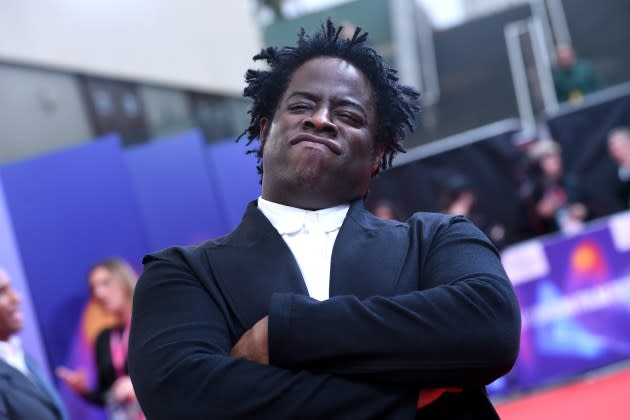
Jeymes Samuel was intent on putting a “hood” vibe into his Biblical epic The Book of Clarence starring LaKeith Stanfield as the eponymous Clarence, a local lad in the Holy Land who gets by dealing weed and holding chariot races against a no-nonsense Mary Magdalene. Clarence soon sees an opening to make some bucks in the Messiah business but then he realizes that miracles can happen when you least expect them. The Book of Clarence, which also features RJ Cyler, Marianne Jean-Baptiste, Omar Sy, David Oyelowo, Teyana Taylor, Anna Diop and Michael Ward, follows the director’s debut feature, The Harder They Fall, which spiced up the Western genre.
DEADLINE: All praise to you because I usually run so fast from Biblical movies, but this one answered my prayers.
More from Deadline
JEYMES SAMUEL: Yeah, we know we’re just in a place and time that we’ve never been. I think the reason why we tune out of these things, just like with Westerns, it’s because we’re never fed. People like us are never fed the nourishment and the vitamins and the ingredients that we need to make this an all-encompassing genre. So it’s easy to tune out of these things. The number of women I would speak to that say, “I hate Westerns, I hate Westerns, I hate Westerns.” And yet now I’m seeing little girls, cheerleaders, doing whole routines to the soundtrack and the scenes of The Harder They Fall.
You love Westerns. A Western is just the geographical time and place the story is set. If you set the Hughes Brothers movie Menace II Society, which was released in 1993, a hundred years earlier, it was Western, right? The cars become horses, the guns are still the same. Now the guys are going to become cowboys. So it’s not that you hate Westerns, it’s that you’re not fed the ingredients you need to tell the story to include you. And I think that’s what happens a lot with the Bible as well, with the Biblical era.
DEADLINE: OK, I get it. What’s so funny about The Book of Clarence is how, for instance, you’ve put Black faces in roles that back in the day would have been played by white actors. Omar Sy, the minute I spotted him in your film I thought of Victor Mature…
SAMUEL: Exactly, my brother. Samson and Delilah. Because Victor Mature was in some of those films that I watched.
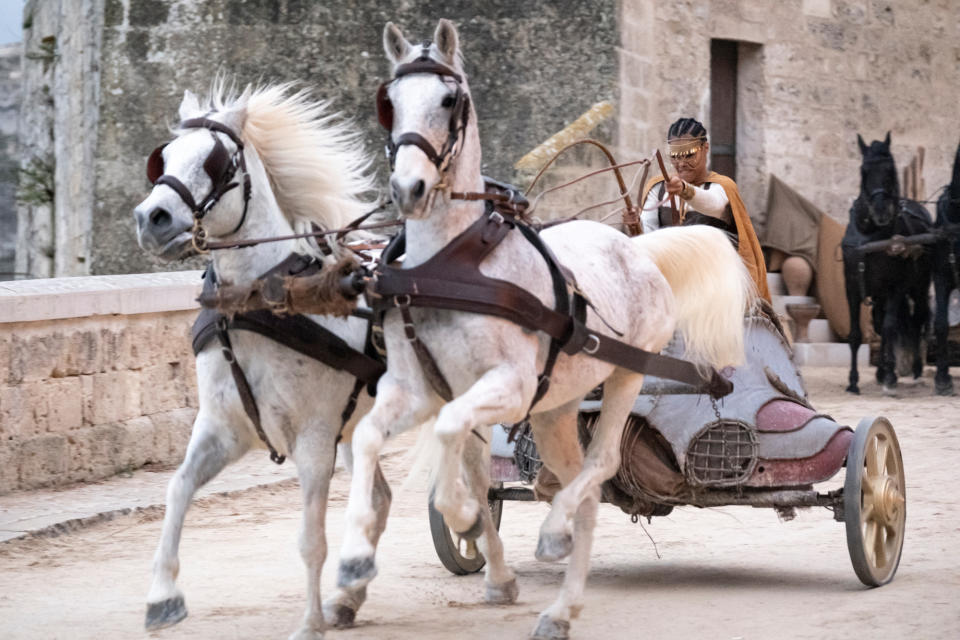
DEADLINE: Yeah, and Charlton Heston and all those other epics by Cecile B. DeMille and William Wyler who made Ben-Hur.
SAMUEL: Yeah. For me, I wanted to tell a story based on the environment that I grew up in but based in the Biblical era, right? Because what would happen, guys, is we learned everything you ever learned about the Bible. Mostly it was when you were growing up and your parents telling you and our relatives… I’m from a Nigerian background, my dad was Roman Catholic. So they’ll be telling us these stories and then you’d look at the films and although I loved those films, the environment and the people just looked nothing like the environment and the people I was growing up in. So I wanted to tell a story about the environment that I grew up in but set in those days and kind of show how nothing’s changed and how alike we all are.
I feel that the Bible, just as a book, so much minutia it doesn’t cover, like where Jesus bought his sandals from or where people will get their hair done. There’s so many little things it doesn’t cover where I’m fascinated by those things just because of the everyday necessities in life. I just thought this was a brilliant way to show how much we are all similar, how much really nothing’s changed whilst showing how much I love that genre.
DEADLINE: Absolutely. You used the word, everyday, and that’s the thing we are able to assess it because I could see it through the everyday but also as a spectacle.
SAMUEL: Exactly. Exactly. You meet your friend having a fight with him, right? You might have a fight in a school playground. In those days you meet your best friend, maybe in a gladiator fight or a chariot race, right? People race cars illegally all the time. Where I grew up, the fastest person in the hood was a girl called Chantelle. She was the fastest driver. She was a getaway driver. The fastest driver in the hood, it’s just Chantelle.
Well, in this film it’s very regular, right? So there’s so much you can do with that era. If you place like Jeymes and Baz in space, there’s so much we can do that we’ve not seen before in space. If you place us in the cowboy days, there’s so much we can do. Place us in a Biblical era, there’s so much we can do and so many more stories we can tell that’ve never been told before. And from our perspective. There’s always been, I feel a veil of non-allowance that where we as Black people aren’t allowed to go. It’s almost like an unwritten rule we’re not allowed to go into these genres. We’re not allowed to go into the Old West where one fourth of every cowboy was Black. The main cowboy was for Black people. White people were called cowhands.
So we weren’t allowed to go into the Old West, just cinematically. I feel the same with the Biblical movies. We’re not allowed to go into that era for some reason. Not only did Hollywood stop making those movies, but Black people were never allowed to really make them in the first place. So I think just the inclusion of more people and adult women and people of color and stuff, just kind of broadens the landscape of storytelling in those genres.
DEADLINE: You’ve made this point to me before that it’s down to us to make these films, to make these plays, to make the music or whatever you want to do and not wait to be asked or told. And you jumped in.
SAMUEL: We had to, Baz. Everything I stand for as a storyteller, everything I stand for as a human being is about inclusion, diversity and freedom. Inclusion, diversity and freedom are the most important things to me as a storyteller. Whether I have a guitar in my hand, or I’m opening the final draft. It’s all about inclusion, diversity and freedom. Freedom to tell the stories that we want to want tell. And I believe that that freedom isn’t given, it’s taken.
DEADLINE: Precisely. You take it, you go after it, and you can’t sit there moaning, “Oh, they don’t do this for me. They don’t do that.” You do it yourself.
SAMUEL: We have to take it. I think a really misguided, misinformed, but influential human being a long time ago changed the words, plans, aims and intention into dreams, right? You cannot change the words, plans, aims and intentions into dreams. And then we started embracing words like my dream project. “It’s a dream for me to do this.” But no dream is attainable. You have dreams while you are awake. As soon as we embrace the word dream for plans, aims and intentions, we embrace the word failure. None of these are dreams. It’s not my dream. It wasn’t my dream to become a filmmaker. It wasn’t my dream to sell a Biblical feature. It was my plan, my aims and my intention. I’m going to make a Western. I’m going to make a Biblical era film.
None of us, no human being, no man, woman or child should ever embrace the word dreams for things they want to do in real life. They’re not dreams. When you get rid of those things, then we are able to make The Harder They Fall. A $90 million movie is your debut. We’re able to make The Book of Clarence. We’re able to tell stories where we take them from the Old West to the New Testament.
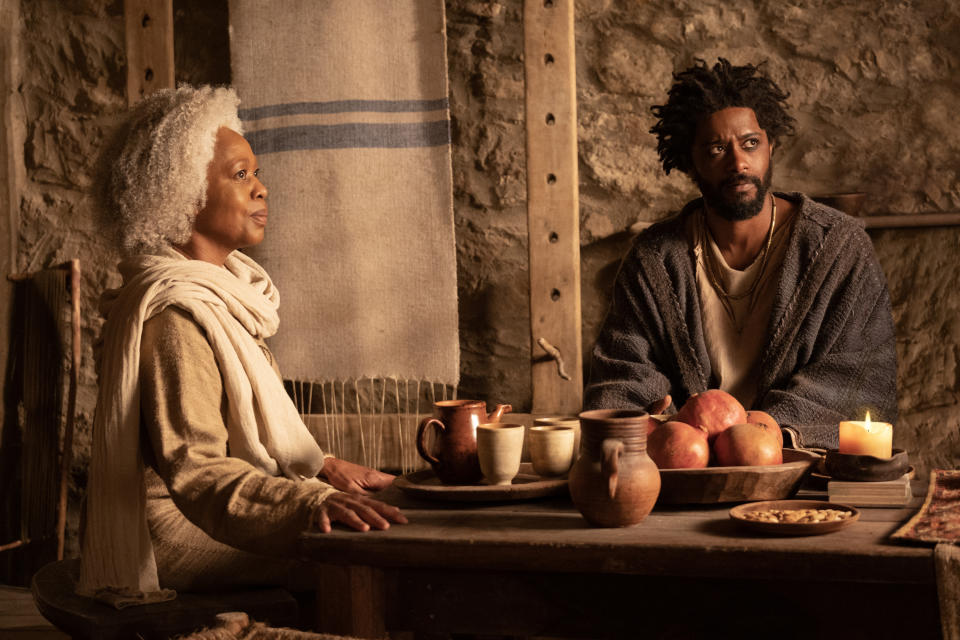
DEADLINE: Where were you watching those Biblical spectaculars when you were a kid. Were you at home on a Sunday afternoon, and then The Ten Commandments, would come on?
SAMUEL: I was watching them exactly how you said. Over Easter, they’ll always show The Ten Commandments or Ben-Hur. If you’re fortunate enough they’ll show Franco Zeffirelli’s Jesus of Nazareth with Robert Powell, all six parts of it with every single dope actor on the planet that wasn’t Black. I’ll watch them like I watched the Westerns, and I would just be marveling at these movies. But I was drawn to the stories that were Bible adjacent, so not necessarily the ones about the Bible, but where the Bible was kind of running alongside them and they would do their whole thing, like Ben-Hur.
He was enslaved, he was kind of influential, of wealth and then enslaved and then became a chariot racer and influential and wealthy again. I was always drawn to those stories where Jesus may just pop up in there. Ben-Hur is being whipped by a Roman and they’re like, “No water for him.” You hear the music and singing, and he looks at the Roman, the Roman freezes, and he feeds Ben-Hur, he quenches his thirst while speaking in the end. Ben-Hur comes back and he goes to see this man that everyone’s talking about being beaten on the stairs, carrying his crucifix. “I know that man. He gave me water once.” I’ve always loved those things. And Jesus dying in Ben-Hur, cured his whole family of leprosy, cured of all the lepers.
I’ve always loved those things where they kind of take a bit of liberty with the Bible because the story runs alongside it. Those are the ones I was drawn to the most because then I know I can tell a really, really cool tale that we can all relate to. A man trying to prove he’s a nobody, a man that believes he can do anything. And this belief gets him in trouble with the neighborhood terrorists, so to speak. Then he ends up on a path of self-discovery, redemption and awakening. I know I could tell a great story like that, but set in a biblical era, it would just be something to marvel at.
DEADLINE: So this is Jeymes Samuel’s Book of Genesis on his movie.
SAMUEL: Yeah, this is Jeymes Samuel’s Ben-Hur. It being my foray into the Bible era, I had to throw everything, I wanted to throw everything. I wanted to throw chariot races, I wanted to throw gladiator fights. I wanted to throw a nightclub scene. They go to the club. What does it look like when we’re in the building? When we’re young. You know how many people from the hood are in the building, not just the rich, not just King Herod and his cohorts and his concubines. What’s that place look like when we are in the building? Let me just give them some nice overeating. It just gives us so much scope.
DEADLINE: What were the parallels? So you have your Clarence character played by LaKeith. Was he modeled ever so slightly on a Charlton Heston and a Kirk Douglas?
SAMUEL: The thing that I didn’t relate to with Charlton Heston’s and Kirk Douglas’s and Victor Mature’s, which is why LaKeith isn’t modeled on those guys is because they were not around the way guys. Charlton Heston looked like his face was born for The Magnificent. Kirk Douglas looked like his face was born for The Magnificent. Victor Mature, his face was born for The Magnificent. My favorite actor of all time is Charles Laughton. He looked like a regular guy from around the corner.
What LaKeith is based on is us. LaKeith is a guy from the hood. The first conversation we ever had, I knew he was Clarence. Because Clarence is about a regular dude that lives around the way. Charlton Heston is anything but regular. Kirk Douglas is anything but regular. Victor Mature is anything but regular. They look like Hollywood heroes. But Clarence is just a regular guy from the hood, and he looks like just a regular unassuming guy from the hood that, like most of us in the hood, really believe we can fly. When we shake off all of the oppression and the shackles. We really believe we can fly and do magnificent things. And LaKeith Stanfield embodies all of that. The character Clarence is based on Baz, is based on Jeymes, he’s based on us. He resembles us. He thinks like us. You were flying in the 80s with Jones, and that’s what LaKeith Stanfield is based on as opposed to those guys. That’s why I didn’t relate to those movies.
DEADLINE: Beautiful, beautiful. Bad on me because why should he be based on anyone but your creation?
SAMUEL: I understand. I totally understand the question because those were the movies that we loved. I loved those movies and Jonathan Majors in The Harder They Fall was based on the heroes of the Old West. But Clarence isn’t about those people, and Clarence isn’t about color. It’s all about inclusion. The Book of Clarence is all about inclusion and diversity. It’s all about inclusion, diversity and freedom. So in that way, any Clarence can be based on the person you walk past every day. We ain’t walking past no Charlton Heston. You know what I mean?
DEADLINE: Got it. And by the way, I love how you do include conversation about race, but not in a heavy-handed way. When Clarence and his friends are confronting the Roman centurions. They do it in a way that seems organic.
SAMUEL: Thank you. I wanted to show that because it was the Roman Empire. The whole world was Rome. They conquered and colonized everywhere. They were going into everywhere, making trouble on the villages. It’s not as if they were welcome. The whole world was being overrun by the Roman Empire. So I really wanted to show that, but also show the modernity and how prevalent those issues still are.
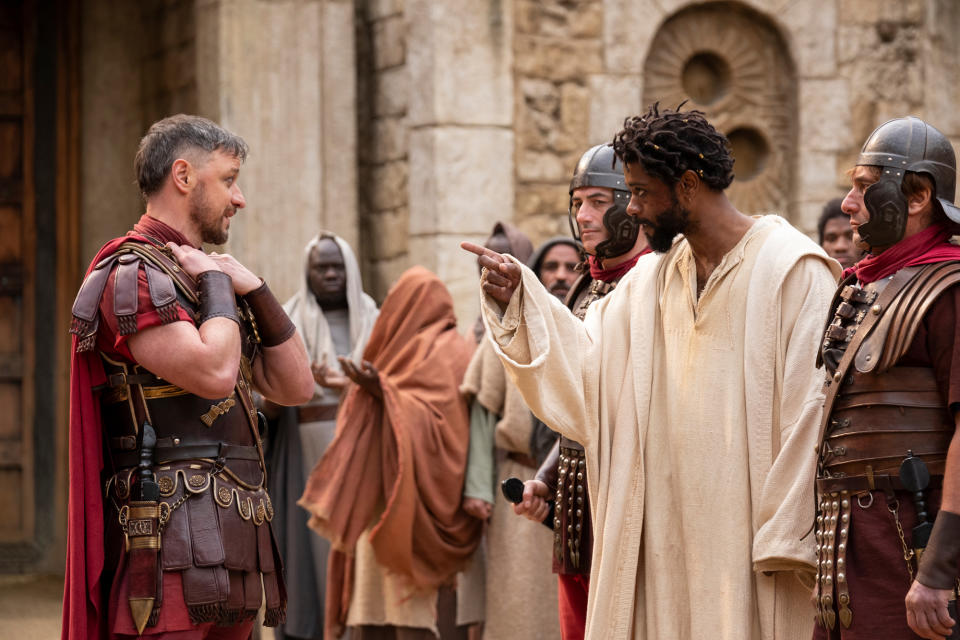
DEADLINE: You have a lot of Caucasian actors in the movie like Benedict Cumberbatch, James McAvoy, Tom Glynn-Carney and Tom Vaughan-Lawlor, how did you woo them?
SAMUEL: Yeah. One of the scenes I was shooting I was like, “I can’t believe I’m actually shooting this movie,” and I believe I could fly. Every scene with Benedict Cumberbatch. Just the way he embraced and understood the mission. Every day, pretty much a lot of times on set, but every day with him on set, I was like, “I’m actually shooting The Book of Clarence. This is the exact movie that’s in my head.” And it just became something to marvel at, on set.
I was fortunate enough that these guys were fans of The Harder They Fall and wanted to work with me. So it was just really Zooms, like, “I want James McAvoy…” It’s just literally just how I cast in general. If I don’t know where someone lives, I’m going to contact their friend and end up at their house. It turns out that he [McAvoy] was a big fan of The Harder They Fall. So it was pretty much pretty straightforward. I’ve always been fortunate when it comes to casting people I want to be in a movie. I think that comes from telling singular stories that people want to come hop on a proverbial wagon, so to speak.
DEADLINE: Yeah. And I thought it was very, very astute to cast Michael Ward as Judas against type, as it were. He’s so dashing that you almost don’t expect him to be the one. Right? And that was very funny.
SAMUEL: Yeah, to be the little rascal, Judas. Also, I wanted to show the Apostles with youth. Michael Ward is a hero to the youth, from Top Boy and Blue Story. He’s a hero. I wanted everyone to be able to watch this film and be able to lock onto someone that they in everyday life relate to. This homeboy from Top Boy, OK, but now we’re in the biblical era.
DEADLINE: A former colleague would fine me every time I swore in the office and say, “God would not like that.” And there’s swearing in this movie but she’d love it. But also talk to me about Biblical accuracy.
SAMUEL: Jesus said in Matthew 24:5, he says, there will be many that come along claiming to be the Messiah, and they will lead many astray. He says that verbatim, Matthew 24:5. And in Jesus’ lifetime, it was maybe 200 to 300 people coming forward saying they were the Messiah and they would be leading people on to give them coin, all for personal gain. Because one thing that people always want is hope. In every single era of my kind, people always want hope. So whilst Jesus of Nazareth was defied, Simon the Sorcerer, who is a character in the Bible, Simon the Sorcerer, was a misguided charlatan, who would say he’s the Messiah, he would be pretending to be the Messiah.
So there’s historical accuracy all through this movie. It doesn’t take anything more than a Google search to read about all of the people that were claiming to be the Messiahs. Incidentally, then and now there’s people that do that, that would just lead people astray. I would try to remain true to the things that were happening in the Bible and the Bible era, while maybe taking liberties with the origins of some things. Like, there’s no history of Mary Magdalene riding a chariot, but we know Mary Magdalene lived in the hood. We know she was looked upon with scorn by the other villagers. We know Jesus washed her of her sins. So while the overall story is original, there’s a lot of historical accuracy in the film.
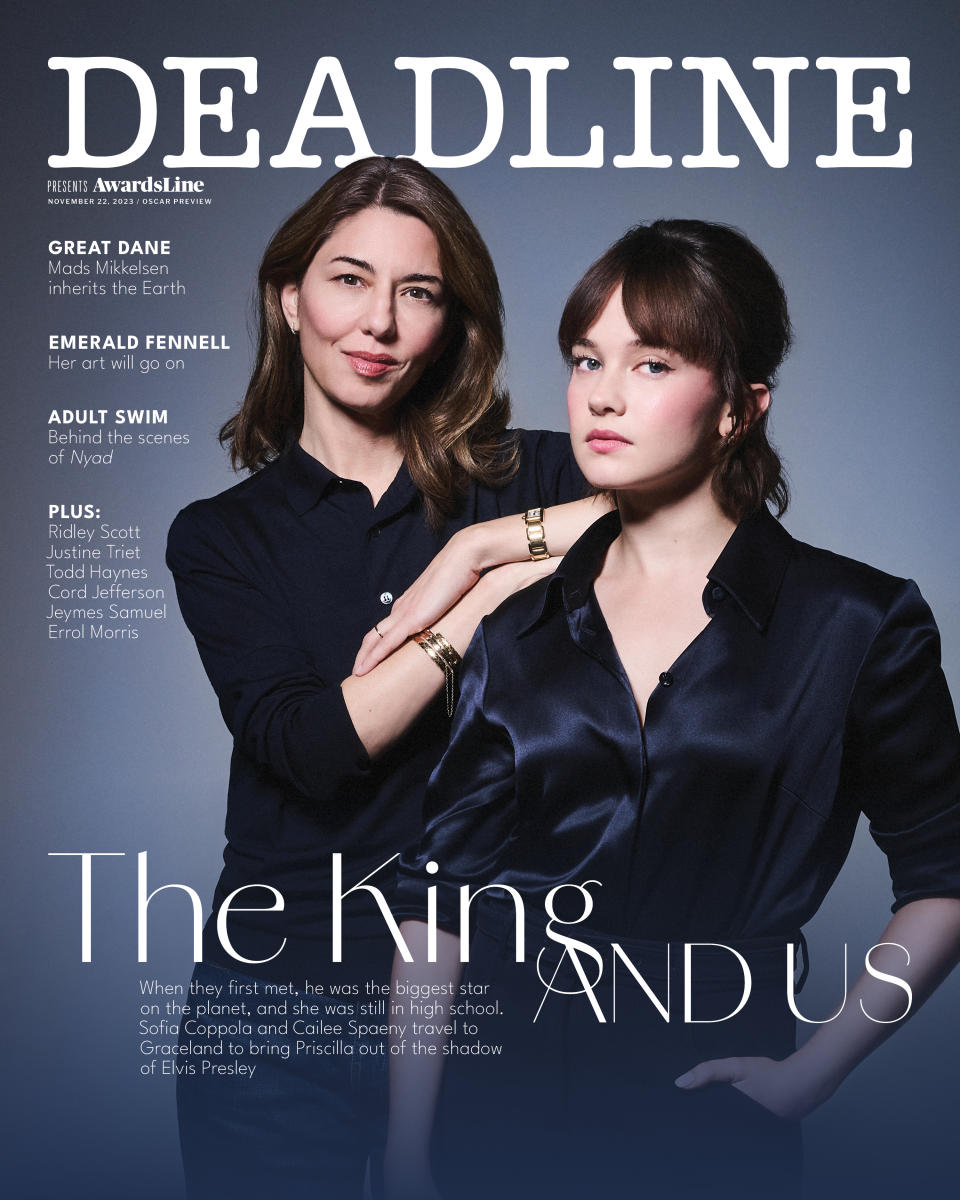
DEADLINE: Did you know your Bible growing up, sounds as if you did.
SAMUEL: Yeah, I knew my Bible growing up as much as say the next person. My mum wasn’t strict about us going to church every Sunday, but she was super religious. My mom has never said a curse word in my entire lifetime. My mom, instead of saying, Oh my God, she’d go, “Jesus, lover of my soul, let me to thy bosom fly.” And my dad used to get angry. She’d always say, “Jesus, lover of my soul, let me to thy bosom fly.” And my dad would go, “Joyce, your bosoms will fly off if you keep saying that nonsense.” He didn’t understand why my mom… All of her amazement would come alongside a Bible part. She would be like, “Holy Lamb of God, that takest away the sins of the Earth, have mercy upon me.” Another person would just say, “What?” My mom would say, “Holy Lamb of God, that takes away the sins of the world, have mercy upon me.” So just having a mom like that would make you know Psalm 23 and Psalm 27, “The Lord is my Shepherd” and “The Lord is my light and my salvation, off by heart.
I know those prayers off by heart, and I’m just familiar with at least all of the elements in… I’m familiar with enough elements of the Bible to be able to go in there and tell a story that has at least some form of historical accuracy to it.
Best of Deadline
Greta Gerwig To Receive Palm Springs Film Festival's Director Of The Year Award
2023 Premiere Dates For New & Returning Series On Broadcast, Cable & Streaming
2023-24 Awards Season Calendar - Dates For Oscars, Emmys, Grammys, Tonys, Guilds & More
Sign up for Deadline's Newsletter. For the latest news, follow us on Facebook, Twitter, and Instagram.

